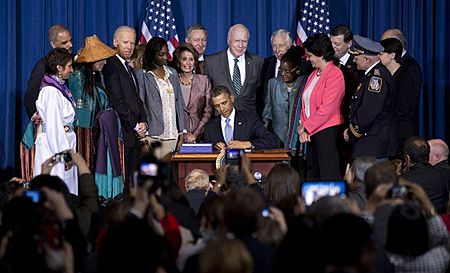Deborah Parker facts for kids
Quick facts for kids
Deborah Parker
|
|
|---|---|
| cicayalc̓aʔ | |
| Born | 1970 (age 55–56) |
| Nationality | Tulalip |
| Citizenship | United States |
| Alma mater | University of Washington (B.A.) |
| Known for | Activism |
| Board member of |
|
| Spouse(s) | Myron Dewey (died 2021) |
| Children | 3 |
Deborah Parker (born 1970) is a respected activist and leader for Native American rights in the United States. Her native name is cicayalc̓aʔ. As a member of the Tulalip Tribes of Washington, she has worked hard to protect Indigenous people and their cultures.
Parker is known for her important work on the Violence Against Women Reauthorization Act of 2013. She helped pass this law, which gave tribal courts more power to protect Native American women and families from harm. She has also served on the boards of many important groups, including Our Revolution and the National Indigenous Women's Resource Center.
Contents
Early Life and Career
Deborah Parker was born in 1970. She has Tulalip, Lummi, Yaqui, and Apache heritage. Her native name, cicayalc̓aʔ, has been passed down through her mother's family for many generations. Growing up on the Tulalip reservation, she saw the challenges her community faced. This inspired her to work for change.
In 1999, she graduated from the University of Washington. After college, she worked for several tribes and organizations. She was mentored by famous Indigenous leaders like Billy Frank Jr. and Joe DeLaCruz. For the Tulalip Tribes, she created a program to help young mothers.
From 2005 to 2012, Parker worked in government affairs for her tribe. In 2012, she was elected vice-chairwoman of the Tulalip Tribes. She was the only woman and the youngest person on the board at the time. After three terms, she decided to focus on her family and activism.
A Voice for Change
Parker believes in standing up for what is right, which she calls having "warrior status." She has won many awards for her work, including the Enduring Spirit Award and the Community Service Award. In 2015, Indian Country Today magazine named her one of the "50 Faces of Indian Country."
Protecting Women and Families

One of Parker's biggest achievements was helping to pass the Violence Against Women Reauthorization Act of 2013 (VAWA). This law helps protect people from harm. Parker fought to include special rules for Native American lands. These rules allow tribal courts to handle cases involving non-Natives who commit crimes on tribal land.
In 2012, the law was in danger of not passing. Parker knew she had to speak up. She traveled to Washington, D.C. and met with Senator Patty Murray. She decided to become "the face" for the issue. The next day, she bravely shared her own experiences at a press conference. She wanted Congress to understand why the law was so important.
Her powerful story made a big difference. The Senate passed the bill with the protections for Native Americans included. Parker then worked hard to convince the House of Representatives to agree. She appeared on news programs and gave interviews across the country.
In March 2013, President Barack Obama signed the new VAWA into law. Parker stood by his side at the signing ceremony. Her efforts helped make communities safer for Native American women and families.
Role in National Politics
In 2016, Parker was a supporter of Bernie Sanders for president. She was chosen to be on the Democratic Party's platform committee. A platform is a list of goals and beliefs that a political party supports. Parker saw this as a chance to make sure Native American issues were included.
During a committee meeting, she proposed an amendment to honor tribal nations. As she read it, she became emotional, and other members helped read it for her. The amendment passed with a standing ovation.
The final text promised that the party would respect treaties with American Indian and Alaska Native tribes. It also called for protecting tribal lands, increasing support for Native communities, and removing racist school mascots.
Environmental Activism
Parker has also protested against large oil pipeline projects. She worries about their impact on the environment and on tribal lands.
In 2016, she joined the Standing Rock tribe to protest the Dakota Access Pipeline. She also led a large protest in Washington, D.C. to bring attention to the issue. In 2017, she was a co-founder of Indigenous Women Rise, a group that marched in the 2017 Women's March. She has also spoken out against the Trans Mountain Pipeline in Canada.
Personal Life and Views
Parker lives in Tulalip, Washington. She is a mother to three children and two stepchildren. She was married to filmmaker Myron Dewey until he passed away in 2021.
Parker believes that the U.S. government has not always treated Indigenous people fairly. She works to protect traditional knowledge, such as ancient environmental practices and medicine. She says it is important to respect these traditions and understand them from a Native perspective.
See also
- History of Native Americans in the United States
- Native American civil rights
- Native American feminism
- Native American reservation politics
- Violence against women in the United States
 | William L. Dawson |
 | W. E. B. Du Bois |
 | Harry Belafonte |

